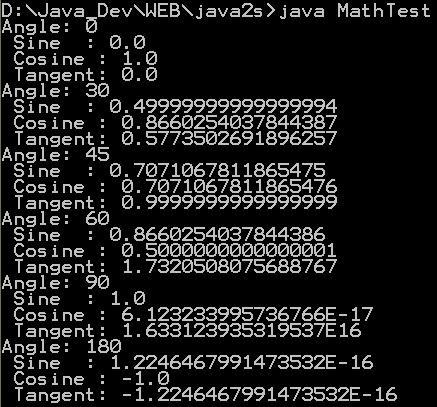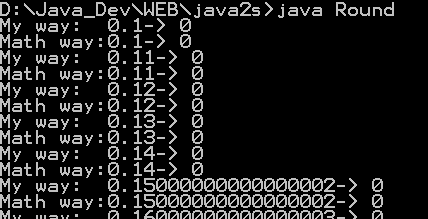Population Standard Deviation
import java.util.Arrays;
/**
* <p>Static methods for doing useful math</p><hr>
*
* @author : $Author: brian $
* @version : $Revision: 1.1 $
*
* <hr><p><font size="-1" color="#336699"><a href="http://www.mbari.org">
* The Monterey Bay Aquarium Research Institute (MBARI)</a> provides this
* documentation and code "as is", with no warranty, express or
* implied, of its quality or consistency. It is provided without support and
* without obligation on the part of MBARI to assist in its use, correction,
* modification, or enhancement. This information should not be published or
* distributed to third parties without specific written permission from
* MBARI.</font></p><br>
*
* <font size="-1" color="#336699">Copyright 2002 MBARI.<br>
* MBARI Proprietary Information. All rights reserved.</font><br><hr><br>
*
*/
public class Util{
/**
* Standard deviation is a statistical measure of spread or variability.The
* standard deviation is the root mean square (RMS) deviation of the values
* from their arithmetic mean.
*
* <b>populationStandardDeviation</b> normalizes values by N, where N is the sample size. This the
* <i>Population Standard Deviation</i>
* @param values
* @return
*/
public static strictfp double populationStandardDeviation(double[] values) {
double mean = mean(values);
double n = values.length;
double dv = 0;
for (double d : values) {
double dm = d - mean;
dv += dm * dm;
}
return Math.sqrt(dv / n);
}
/**
* Calculate the mean of an array of values
*
* @param values The values to calculate
* @return The mean of the values
*/
public static strictfp double mean(double[] values) {
return sum(values) / values.length;
}
/**
* Sum up all the values in an array
*
* @param values an array of values
* @return The sum of all values in the Array
*/
public static strictfp double sum(double[] values) {
if (values == null || values.length == 0) {
throw new IllegalArgumentException("The data array either is null or does not contain any data.");
}
else {
double sum = 0;
for (int i = 0; i < values.length; i++) {
sum += values[i];
}
return sum;
}
}
}
Related examples in the same category
| 1. | Absolute value | | |
| 2. | Find absolute value of float, int, double and long using Math.abs | | |
| 3. | Find ceiling value of a number using Math.ceil | | |
| 4. | Find exponential value of a number using Math.exp | | |
| 5. | Find floor value of a number using Math.floor | | |
| 6. | Find minimum of two numbers using Math.min | | |
| 7. | Find power using Math.pow | | |
| 8. | Find square root of a number using Math.sqrt | | |
| 9. | Find natural logarithm value of a number using Math.log | | |
| 10. | Find maximum of two numbers using Math.max | | |
| 11. | Get the power value | |  |
| 12. | Using the Math Trig Methods | |  |
| 13. | Using BigDecimal for Precision | |  |
| 14. | Demonstrate our own version round() | |  |
| 15. | Demonstrate a few of the Math functions for Trigonometry | |  |
| 16. | Exponential Demo | |  |
| 17. | Min Demo | | |
| 18. | Basic Math Demo | |  |
| 19. | Using strict math in applications | |  |
| 20. | Conversion between polar and rectangular coordinates | | |
| 21. | Using the pow() function | | |
| 22. | Using strict math at the method level | | |
| 23. | Calculating hyperbolic functions | | |
| 24. | Calculating trigonometric functions | | |
| 25. | Weighted floating-point comparisons | | |
| 26. | Solving right triangles | | |
| 27. | Applying the quadratic formula | | |
| 28. | Calculate the floor of the log, base 2 | | |
| 29. | Greatest Common Divisor (GCD) of positive integer numbers | | |
| 30. | Least Common Multiple (LCM) of two strictly positive integer numbers | | |
| 31. | Moving Average | | |
| 32. | Make Exponention | | |
| 33. | Caclulate the factorial of N | | |
| 34. | Trigonometric Demo | |  |
| 35. | Complex Number Demo | | |
| 36. | sqrt(a^2 + b^2) without under/overflow | | |
| 37. | Returns an integer hash code representing the given double array value. | | |
| 38. | Returns an integer hash code representing the given double value. | | |
| 39. | Returns n!. Shorthand for n Factorial, the product of the numbers 1,...,n as a double. | | |
| 40. | Returns n!. Shorthand for n Factorial, the product of the numbers 1,...,n. | | |
| 41. | Returns the hyperbolic sine of x. | | |
| 42. | Contains static definition for matrix math methods. | | |
| 43. | For a double precision value x, this method returns +1.0 if x >= 0 and -1.0 if x < 0. Returns NaN if x is NaN. | | |
| 44. | For a float value x, this method returns +1.0F if x >= 0 and -1.0F if x < 0. Returns NaN if x is NaN. | | |
| 45. | Normalize an angle in a 2&pi wide interval around a center value. | | |
| 46. | Normalizes an angle to a relative angle. | | |
| 47. | Normalizes an angle to an absolute angle | | |
| 48. | Normalizes an angle to be near an absolute angle | | |
| 49. | Returns the natural logarithm of n!. | | |
| 50. | Returns the least common multiple between two integer values. | | |
| 51. | Gets the greatest common divisor of the absolute value of two numbers | | |
| 52. | Matrix manipulation | | |
| 53. | Returns exact (http://mathworld.wolfram.com/BinomialCoefficient.html) Binomial Coefficient | | |
| 54. | Returns a double representation of the (http://mathworld.wolfram.com/BinomialCoefficient.html) Binomial Coefficient | | |
| 55. | Returns the natural log of the (http://mathworld.wolfram.com/BinomialCoefficient.html) Binomial Coefficient | | |
| 56. | Returns the hyperbolic cosine of x. | | |
| 57. | Math Utils | | |
| 58. | Implements the methods which are in the standard J2SE's Math class, but are not in in J2ME's. | | |
| 59. | Utility methods for mathematical problems. | | |
| 60. | A math utility class with static methods. | | |
| 61. | Computes the binomial coefficient "n over k" | | |
| 62. | Log Gamma | | |
| 63. | Log Beta | | |
| 64. | Beta | | |
| 65. | Gamma | | |
| 66. | Factorial | | |
| 67. | Computes p(x;n,p) where x~B(n,p) | | |
| 68. | Returns the sum of two doubles expressed in log space | | |
| 69. | sigmod | | |
| 70. | sigmod rev | | |
| 71. | Numbers that are closer than this are considered equal | | |
| 72. | Returns the KL divergence, K(p1 || p2). | | |
| 73. | Returns the sum of two doubles expressed in log space | | |
| 74. | Returns the difference of two doubles expressed in log space | | |
| 75. | Is Prime | | |
| 76. | Statistical functions on arrays of numbers, namely, the mean, variance, standard deviation, covariance, min and max | | |
| 77. | This class calculates the Factorial of a numbers passed into the program through command line arguments. | |  |
| 78. | Calculates the Greatest Common Divisor of two numbers passed into the program through command line arguments. | | |
| 79. | Variance: the square of the standard deviation. | | |
| 80. | Returns from a static prime table the least prime that is greater than or equal to a specified value. | | |